Students can Download English Poem 1 Once Upon A Time Questions and Answers, Summary, Activity, Notes, Samacheer Kalvi 11th English Book Solutions Guide Pdf helps you to revise the complete Tamilnadu State Board New Syllabus and score more marks in your examinations. Learn the Samacheer Kalvi 11th English Grammar to enhance your grammar skills like reading comprehension, passage writing, parts of speech, tenses, passive and active voice, and many other concepts in no time.
Tamilnadu Samacheer Kalvi 11th English Solutions Poem Chapter 1 Once Upon A Time
Warm Up
Question (a)
Guess what friendly words these two gentlemen exchange when shaking hands.
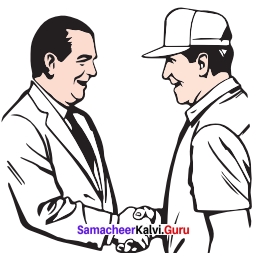
Answer:
James: Hi John, great to see you. How are you? John: Hi James I’m fine. It is nice to see you.
Question (b)
The children in the picture are watching an exciting sporting event, where their school team is winning. Suggest suitable utterances reflecting their feelings:
Answer:
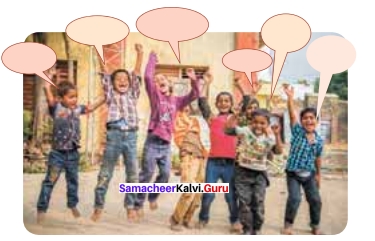
First child : Sixer…
Second child : Ramesh, the invincible.
Third child : My School Team is great!
Fourth child : Hurrah!
Fifth child : Fantastic six!
Sixth child : Wow, what a lovely shot!
Question (c)
Given a chance, any adult would wish to become a child again for many reasons. Fill the boxes with some of what you imagine could be the reasons.
| e.g. I need not worry about project deadlines. | |||
| I can wear my pajamas the whole day. | |||
| I can sleep as long as I like. |
Answer:
Reasons for wishing to become a child again.
| e.g. I need not worry about project deadlines. | As man advances in years he ceases to be innocent. | Man doesn’t show his real feelings. | He reveals only that part of his personality which is worthy of acceptance. |
| I can wear my pajamas the whole day. | As everyone involves in a “make-believe” relationship, even good people are forced to wear masks, for the sake of keeping links alive. | The face is no more the index of the mind. It is inscrutable. | Even loud laughter could conceal a plot to topple. |
| I can sleep as long as I like. | People keep on changing their face mask like dresses. | We don’t know who are our real friends. | If we are frank, we gain real enemies and false friends. |
Samacheer Kalvi 11th English Once Upon A Time Textual Questions
1 Based on your understanding of the poem answer the following questions in one or two sentences each:
Once upon a time, son
They used to laugh with their hearts
And laugh with their eyes:
But now they only laugh with their teeth
While their ice-block-cold eyes
Search behind my shadow.
There was a time indeed
They used to shake hands with their hearts
But that’s gone, son
Now they shake hands without hearts
While their left hands search
My empty pockets.
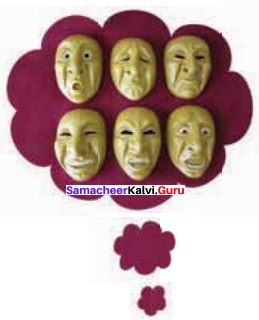
“Feel at home!”, “Come again”
They say, and when I come
Again and feel
At home, once, twice
There will be no thrice For then I find doors shut on me.
So I have learned many things, son
I have learned to wear many faces
Like dresses – home face
Office face, street face, host face
Cocktail face, with all their conforming smiles
Like a fixed portrait smile.
And I have learned too
To laugh with only my teeth
And shake hands without my heart
I have also learned to say “Goodbye”
When I mean “Good-riddance”
To say “Glad to meet you”
Without being glad; and to say “It’s been
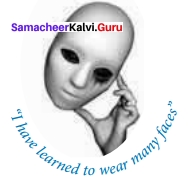
Nice talking to you”, after being bored.
But believe me, son
I want to be what I used to be
When I was like you. I want
To unlearn all these muting things
Most of all, I want to relearn
How to laugh, for my laugh in the mirror
Shows only my teeth like a snake’s bare fangs!
So show me, son
How to laugh; show me how
I used to laugh and smile
Once upon a time when I was like you.
![]()
Question (i)
What do you associate with the title of the poem?
Answer:
The title of the poem makes us associate it with a fairy tale which has a happy beginning and ending.
Question (ii)
What is the relationship between the narrator and the listener?
Answer:
The narrator is the father. The son is the listener.
Question (iii)
What happens to the poet when he visits someone for the third time?
Answer:
When he visits someone for the third time their door remains shut for the poet.
Question (iv)
Pick out the expressions that indicate conflicting ideas.
Answer:
Conflicting ideas are expressed in the following phrases found in the poem: laugh with their teeth; shake hands without hearts; like a fixed portrait smile; “Glad to meet you” without really being glad and “It’s been nice talking to you”.
Question (v)
How does the poet compare his face with dresses?
Answer:
He often changes his face to that of changing dresses for suitable occasions.
Question (vi)
What does the poet mean when he says ‘goodbye’?
Answer:
When the poet says ‘goodbye’ he really means “good riddance”.
![]()
Question (vii)
What pleasantries does the poet use to fake cordiality?
Answer:
Goodbye, Glad to meet you and It’s been nice talking to you are the pleasantries.
Question (viii)
What does he desire to unlearn and relearn?
Answer:
The poet desires to unlearn the hypocrisies or unreal things he has learned to keep up appearances. He wants to relearn how to laugh and smile as he had done early during his own childhood days.
Question (ix)
How is the poet’s laugh reflected in the mirror?
Answer:
The poet’s laugh is reflected like a snake’s bare teeth.
Question (x)
What does the poet long for?
Answer:
The poet longs for the innocence of childhood days when he laughed with his heart.
Question (xi)
Mention the qualities the child in the poem symbolizes.
Answer:
The child is the symbol of innocence, purity, enthusiasm, happiness, and genuineness.
(2) Fill in the blanks choosing the words from the box given and complete the summary of the poem:
The poet Okara in this narrative monologue painfully condemns the (a) _______ displayed. by adults, both in their words and actions. Here, a father laments to his son about the negative changes that creep into the attitude and behaviour of humans, when they grow into (b) _______ He says that people used to be (c) _______ when they laugh arid the honesty would be reflected in their eyes. But, people of modem times laugh (d) _______ Their handshakes used to be warm and happy conveying a sense of togetherness, but nowadays the handshakes have become a mere (e) _______ He warns his son that people do not trustworthy and have become so selfish that they are concerned only about their own (J) _______ benefits. People utter words of welcome and exchange (g) _______ but those words come only from the tip of their tongues and not from the depth of their hearts. Humans have learned the art of changing their (h) _______ expressions according to situations merely to ensure social acceptance. They wear (i) _______ and exhibit multiple faces. The narrator admits that he has also changed into a hypocrite. However, he tells his son that though he (j) _______ his expressions, he does all these against his will. He says he wants to become a (k) _______ again and laugh genuinely. He wants to (k) _______ the unreal things and (m) _______ how to laugh as he had done once upon a time. When he laughs before the (n) _______ , he sees no expression. His teeth are bare like that of the (o) _______ of a snake. So, he asks his son to show him how to laugh the way he used to laugh when he was a kid like him.
| relearn | adults | facial |
| personal | fangs | child |
| fakes | superficially | duplicity |
| genuine | unlearn | falsity |
| masks | mirror | pleasantries |
Answer:
(a) falsity
(b) adults
(c) genuine
(d) superficially
(e) duplicity
(f) personal
(g) pleasantries
(h) facial
(i) masks
(j) fakes
(k) child
(l) unlearn
(m) relearn
(n) mirror
(o) fangs
(3) A. Interpret each of the following expressions used in the poem, in one or two lines.
Question (i)
laugh with their eyes
Answer:
Eyes are the gateways of souls. The love for fellow humans was explicit in the eyes when people laughed with their eyes.
![]()
Question (ii)
shake hands without hearts
Answer:
In modem times, a handshake is just a sign of cordiality. There is no human warmth. So, the poet says people laugh without heart.
Question (iii)
like a fixed portrait smile
Answer:
People have a fixed ready-made smile for all occasions. Their smiles are enigmatic and inscrutable. One can’t say whether the smile is meant to exhibit warmth or love.
Question (iv)
hands search my empty pockets
Answer:
Human contacts are not focused on building or creating a bond of love. When courtesies are being exchanged one weighs the other’s social status and financial position. It is like a business ritual.
Question (v)
to unlearn all these muting things
Answer:
The hypocrisies of people who feign to have love and respect for fellow humans need to be dispensed with. The poet realizes that he must unlearn all superficial and unnatural behaviours like portrait smiles and heartless handshakes.
B. Read the lines given below and answer the questions that follow:
Question (i)
‘But now they only laugh with their teeth,
While their ice-block-cold eyes… ’
Question (a)
Who are ‘they’?
Answer:
‘They’ refer to modem people.
Question (b)
Explain: ice-block-cold eyes
Answer:
Ice-block cold eyes’ means eyes lacking a feeling of warmth or endearing feelings like love, sympathy, and empathy.
Question (c)
Identify the figure of speech used here.
Answer:
‘Ice block cold eyes’ has been used as a metaphor. It implies that the man who laughs with his ice-cold block eyes has no real emotions. He looks through people.
(d) ‘Most of all, I want to relearn.
How to laugh, for my laugh in the mirror
Shows only my teeth like a snake’s bare fangs! ’
Question (a)
Why does the poet want to relearn how to laugh?
Answer:
The poet has forgotten to laugh naturally. He wants to relearn to laugh because his laugh in front of the mirror shows his teeth like a snake’s bare fangs.
Question (b)
Whom does the poet want to relearn from?
Answer:
The poet wants to relearn from his little son.
Question (c)
Mention the figure of speech used here.
Answer:
A simile is the figure of speech employed here in the last line.
C. Explain the following lines with reference to the context:
Question (i)
Once upon a time, son
They used to laugh with their eyes:
Answer:
Reference: These lines are from the poem, “Once upon a time” written by Gabriel Okara.
Context: The poet says these words to his son while discussing his own happy, childhood days.
Explanation: The poet compares the behaviour of people in the past and those in modem times. He tells his son that people in the past used to laugh with their eyes. There was an expression of genuine warmth among f people when they laughed.
![]()
Question (ii)
There will be no thrice.
Answer:
Reference: This line is from the poem, “Once upon a time” written by Gabriel – Okara.
Context: People would say “feel at home” “come again” to keep appearances.’ This would cease if one visits a third time.
Explanation: The semblance of cordiality will disappear if one visits for the third; time to meet the people who used the aforesaid kind words. In fact, they would shut the door on his face. One should not believe those words and visit their houses frequently. I have learned to wear my faces Like dresses of changing their facial expressions according to the situations merely to ensure social acceptance. The poet also has started wearing faces like dresses, changing them according to fashion and season, and almost daily. He regrets his hypocrisy but is helpless.
Question (iii)
I have learned to wear my faces
Like dresses…
Reference: These lines are from the poem “Once Upon a Time” written by Gabriel Okara.
Context: The poet says these words while admitting how he himself started putting on appearances to conform to the changed attitude of people
in modem times.
Explanation: The poet registers his displeasure over the negative changes that have influenced the behaviour of adults. The adults have mastered the art
Question (iv)
I want to be what I used to be
Reference: This line is from the poem “Once upon a time” written by Gabriel Okara.
Context: The poet says these words while contrasting the present hypocrisy with his past genuine relationships.
Explanation: During childhood, the poet, like any child, laughed with human warmth. He used to express his love through his eyes. Now, he is changing his faces like dresses to suit the occasions and to ensure social acceptance. So, he wants to be what he used to be in childhood.
Additional Appreciation Questions
(i) ‘I have learned to wear many faces like dresses’
Question (a)
Who does ‘I’ refer to?
Answer:
‘I’ refers to the poet Gabriel Okara.
![]()
Question (b)
Why did the poet wear many faces?
Answer:
The poet wore many faces to suit the situation and to be accepted by fellow humans in society.
Question (c)
What is the figure of speech employed here?
Answer:
Simile – faces like dresses.
(ii) ‘Cocktail face, with all their conforming smiles Like a fixed portrait’
Question (a)
Why does the poet use the term “Cocktail” for the face?
Answer:
The face does not show a single emotion. It is no more the index of the mind. It is a combination of various emotions. So, the poet uses the term “cocktail face”.
Question (b)
What is the figure of speech employed in the first line?
Answer:
Metaphor is the figure of speech employed in the first line.
Question (c)
Identify the figure of speech employed in the second line.
Answer:
A simile is the figure of speech employed in the second line.
(4) Answer the following questions in about 100 – 150 words each:
Question (i)
Explain the things the poet has learned when he grew into an adult.
Answer:
The African poet observes a marked change in the altitude of Africans. Those who were once so genuine, warm and sincere, have now suddenly turned cold and hostile towards him. He realizes that the early values in African society like sincerity, good-naturedness, simplicity, whole-heartedness, hospitality, friendliness, originality, and uniqueness have now drastically changed. The earlier warmth and heartfulness has gone. He finds himself behaving the same way as those around him. He has learnt to wear different faces for different occasions. He wears faces like dresses. He says not what his heart tells him. His smiles are also fake. He smiles only to be socially accepted. He has learnt to say “Goodbye”. After being bored, he brings a fake smile and says “It’s been nice talking to you” when he meant “good-riddance”.
Question (ii)
This poem is nothing but criticism of modern life. Justify this statement.
Answer:
The poet’s understanding of adult society is extremely negative. The poet distinctly portrays how people in modem times have become hypocrites and fake emotions to be socially accepted. The phrases of hospitality they use “feel at home” and “come again” are fake that a third visit would be disallowed by the hosts. In modem times, people don’t value real emotions instead they value positions and possessions. Even while shaking r hands, they try to assess the material worth of a person. People don’t laugh with heart, Their ice-cold block eyes search the person they talk to. Most of them have acquired the skill of wearing a standard, deceitful, artificial smile on all occasions, i.e., “portrait smile”. Thus the poem is nothing but criticism of modem life.
![]()
Question (iii)
‘Face is the index of the mind.’ Does this adage concur with the views of the poet?
Answer:
Unlike the people of the past, people in modem times “laugh only with their teeth” while their ice-block cold eyes search for something. Now, people shake hands without hearts. There is no human warmth in social relations. While they shake hands, they look for. evidence to judge the financial status of a person. People say ‘feel at home’ and ‘come again’.
But if a person visits a third time he is not welcomed. They all have cocktail faces ready for all occasions. Their conforming smiles are like fixed portrait smile. They wear standard, deceitful, artificial smiles for all occasions. They have faces like masks. The poet has learned from them how to use faces like dresses, home face, office face, street face, host face, etc. Their faces, like the teeth of the elephant, show only what is accepted. The ugly side of their personality is cleverly hidden behind their deceitful smiles and polite words. So, the poet’s views do not concur with the adage “Face is the index of the mind”.
Additional Questions
Question (i)
Discuss the central theme and tone of the poem “Once upon a time”.
Answer:
The poem has mixed feelings of childhood, regret, and innocence. The child (son) in the poem is a symbol of innocence, purity, enthusiasm, happiness, and genuineness which are lacking in modem society. The child also represents a group of people not affected by western culture and abides by their own culture. Innocence is a fading aspect of man’s society. People always appear deceitful and cunning. The child acts without any malice. The poet finds himself behaving the same way others behave. He is also wearing faces like dresses. He has lost his true cultural identity. He does possess a different portrait smile, the fixed look for different occasions, the unnatural smile plastered across his face. The poet is struck by a sense of self-loathing and regret turns to his son to help him unlearn all unreal things and help him regain his child-hood innocence.
listening Activity
(5) First read the questions given below. Next, listen to an excerpt from a poem read out by your teacher or played in a recorder. Note how a child admires and praises the abilities of his/her father. Then tick the right answers from the options given.
(For listening to the poem refer to our website www.fullcircleeducation. in)
Father:
(by Edgar Albert Guest)
My father knows the proper way
The nation should be run;
He tells us, children, every day
Just what should now be done?
He knows the way to fix the trusts,
He has a simple plan;
But if the furnace needs repairs,
We have to hire a man.
My father, in a day or two
Could land big thieves in jail;
There’s nothing that he cannot do,
He knows no words like “fail.”
‘Our confidence” he would restore
Of that there is no doubt;
But if there is a chair to mend,
We have to send it out.
In conversation, the father can
Do many wondrous things;
He’s built upon a wiser plan
Then presidents or kings.
He knows the ins and outs of each
And every deep transaction;
We look to him for theories,
But look to ma for action
Question (i)
When the needs to be repaired, they have to hire a man.
(a) heater
(b) furnace
(c) stove
(d) oven
Answer:
(b) furnace
![]()
Question (ii)
Father knows no word like
(a) fail
(b) frail
(c) jail
(d) snail
Answer:
(a) fail
Question (iii)
It is certain that the father would restore the family members.
(a) glory
(b) prosperity
(c) confidence
(d) happiness
Answer:
(c) confidence
Question (iv)
The father will not be able to mend a broken
(a) table
(b) bench
(c) chair
(d) stool
Answer:
(c) chair
Question (v)
The children expect them to guide them in action.
(a) mother
(b) father
(c) teacher
(d) guardian
Answer:
(a) mother
Once Upon A Time About the Poet
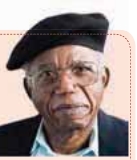
Gabriel Okara (1921) is a Nigerian poet and novelist. His poems have been translated into many languages. Before establishing himself as an accomplished writer in 1960 he had written poems for Black Orpheus. He has conferred the best award for Literature at the Nigerian Festival of Arts in 1953. He was also honoured with the Commonwealth Poetry. Award. Okara’s specialty is that his poems emerge from everyday reality, merge with moments of delight and move back to reality making a complete circle. His prose and poetry were infused with African thought, folklore, and imagery. Okara’s poems show great sensitivity, perceptive judgments, and tremendous energy. This poem “Once Upon a Time” reminds one of William Wordsworth’s “Ode: Intimations of Immortality from Recollection of Early Childhood”. Okara illustrates the changes a father has seen in him throughout his life which have been influenced by the way the society has changed.
Once Upon A Time Summary
Poet Okara condemns false appearances projected by people to safeguard their own interests. He bemoans the loss of genuine laughter and deep relationship between friends when he was a kid. He is saddened by the inconsistent nature of people and how successfully they take emotions to suit their convenience and personal ends. They show false warmth during daily exchanges of courtesy and wear masks to prevent the discovery of their real feelings. The poet admits that he had also become a hypocrite like the rest and his reflection in the mirror does not reflect the warmth of human love but the fangs of a snake deadly enough to kill fellow humans. So, he requests his son to teach the forgotten art of spontaneous and genuine laughter similar to his boyhood days.
![]()
Once Upon A Time Glossary
Textual:
cocktail face-face showing mixed emotions conforming smiles like a fixed portrait smile – wearing a standard deceitful artificial smile on all occasions
fangs – teeth of a venomous snake, used to inject poison
good-riddance – an expression of relief at being free of an unwanted person
ice-block-cold eyes – eyes lacking a feeling of warmth or endearing expression
laugh with their teeth – to fake a laugh, laugh without associated emotions
search behind my shadow – people are hypocritical and they don’t mean what they say
while their left hands search my empty pockets – evaluating the narrator’s worth and power or calculating how he could be exploited
Additional:
deceitful – cunning
emotion – strong feelings
fake – untrue
falsehood – lie
genuine – real
hypocritical – insincere
hypocrite – dishonest person
inconsistent – changing
safeguard – protect
semblance – appearance